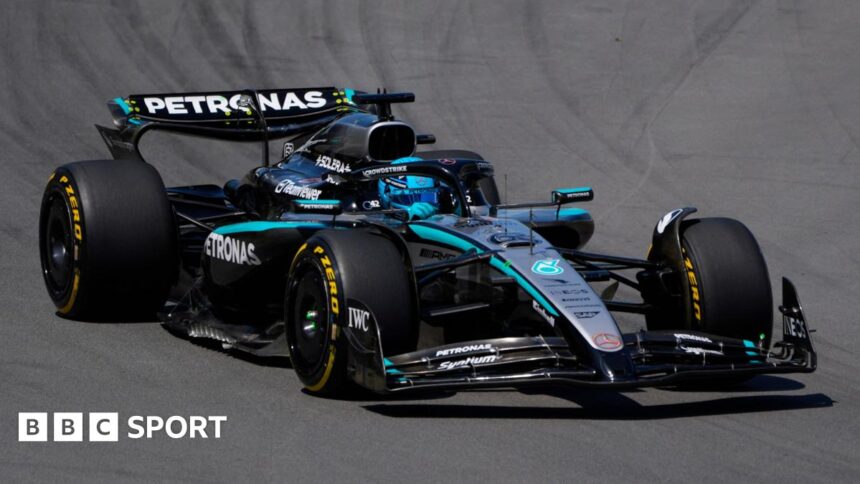In the rain-soaked crucible of Montreal’s Circuit Gilles Villeneuve, George Russell emerged victorious on Sunday, claiming his second career Formula 1 win amid conditions that tested the mettle of even the sport’s most seasoned drivers. The 26-year-old Briton’s triumph wasn’t just about speed—it was a masterclass in patience, tactical awareness, and seizing opportunity when others faltered.
As sheets of rain descended upon the iconic circuit, transforming it into a treacherous puzzle of standing water and diminished visibility, Russell maintained remarkable composure. His victory came against a backdrop of drama that saw McLaren teammates Lando Norris and Oscar Piastri collide while battling for the lead—a moment that will likely echo through team meetings for weeks to come.
“Sometimes in Formula 1, you make your own luck,” I found myself thinking as Russell navigated his Mercedes through the spray. The unpredictable Canadian weather has long been a great equalizer in the sport, revealing which drivers possess that rare combination of raw speed and judgment when grip becomes precious and margins for error disappear.
What makes Russell’s win particularly compelling is how it contrasts with the narrative that has defined Mercedes in recent seasons. After years of dominance, the team has been fighting to reclaim their position at the pinnacle of the sport. This victory serves as a testament to their resilience and Russell’s ability to deliver when circumstances align—a quality that separates champions from contenders in this most technical of sporting arenas.
The McLaren incident that helped pave Russell’s path to victory deserves its own analysis. When Norris and Piastri collided, it wasn’t merely a racing incident but a microcosm of the pressures within a team experiencing a competitive resurgence. McLaren has shown tremendous pace this season, but Sunday’s collision represents the fine line between aggressive team racing and costly mistakes. For a team principal like Andrea Stella, managing this dynamic becomes as crucial as any technical development.
For followers of F1’s broader cultural narratives, Russell’s win reinforces a compelling storyline: the emergence of Britain’s next generation of racing talent stepping out from the considerable shadow cast by Lewis Hamilton. As Hamilton prepares for his move to Ferrari next season, Russell’s performance suggests Mercedes has already secured its future standard-bearer.
The Canadian Grand Prix has always held a special place in Formula 1’s calendar, often producing unexpected results and memorable moments. From Gilles Villeneuve’s legendary drives to the Wall of Champions claiming its victims, Montreal has a way of writing dramatic chapters in the sport’s history. Russell’s win now joins this storied tradition, marked by the contrast between his measured approach and the chaos unfolding around him.
What’s particularly fascinating from a trend analysis perspective is how this race reflects Formula 1’s current competitive landscape. We’re witnessing perhaps the most open championship battle in years, with multiple teams capable of victory on any given Sunday. This democratization of competitiveness has revitalized interest in the sport, creating narratives that extend beyond a single dominant team or driver.
In the aftermath of his victory, Russell’s demeanor reflected a driver who understands both the fortune and skill required to succeed at this level. There was joy, certainly, but also a measured awareness that in Formula 1’s current competitive environment, capitalizing on opportunity is essential. The championship remains highly contested, with Red Bull’s Max Verstappen maintaining his overall lead despite finishing off the podium.
For Mercedes, Russell’s triumph offers a glimpse of potential resurgence. Team principal Toto Wolff has spoken repeatedly about the challenges of adapting to Formula 1’s current regulatory era. Sunday’s result suggests their persistence may finally be yielding tangible results, though whether this represents a turning point or merely a weather-assisted anomaly remains to be seen.
As we look ahead to the remainder of the season, Russell’s Canadian success adds another layer of intrigue to a championship that continues to defy prediction. In a sport where technological advantages can often seem predetermined, the human element—decision-making under pressure, adaptability to changing conditions, mental resilience—remains gloriously unpredictable.
For Russell personally, this victory affirms what many observers have long believed: beneath his composed exterior lies a driver of exceptional ability, capable of delivering when opportunity presents itself. In the constantly evolving landscape of sporting narratives, Russell’s story is one of patience rewarded and potential gradually realized.
As the Formula 1 circus packs up from its Canadian adventure, one question lingers: Will we look back on this rain-soaked Sunday in Montreal as merely an interesting footnote in the season, or as the moment when new contenders truly announced themselves in the battle for supremacy? Only time—and the remaining races of this fascinating championship—will tell.










